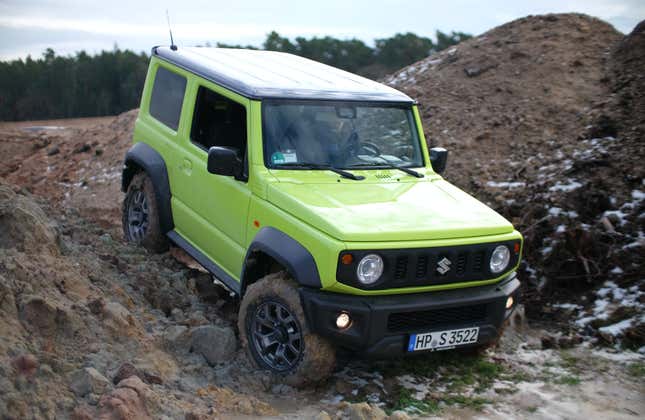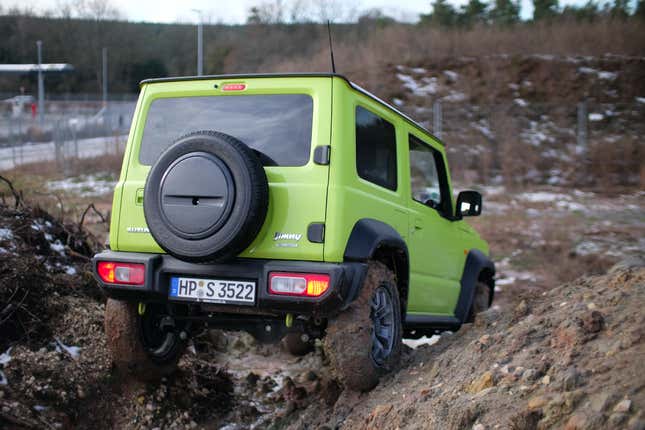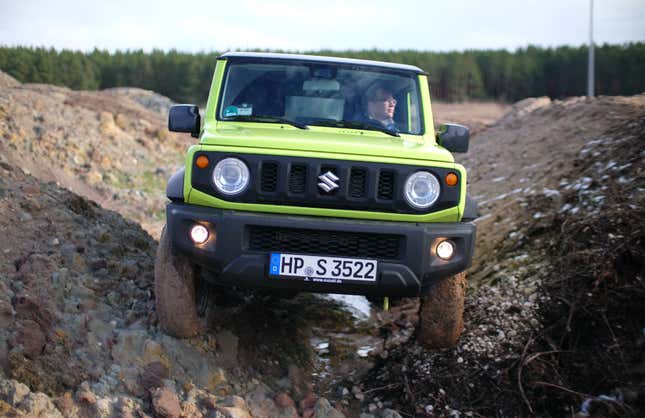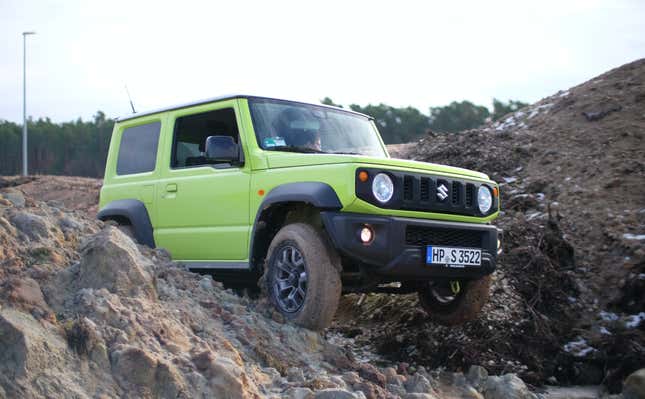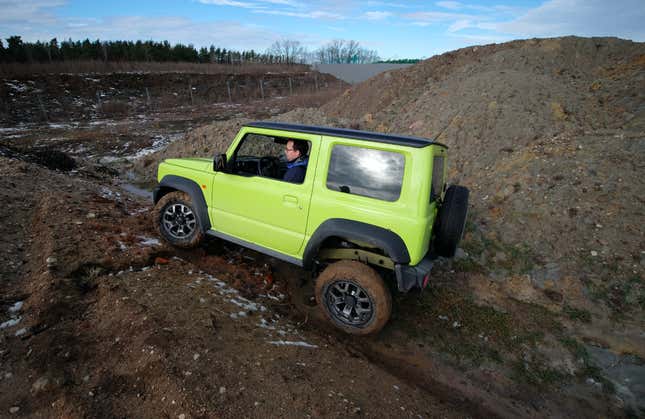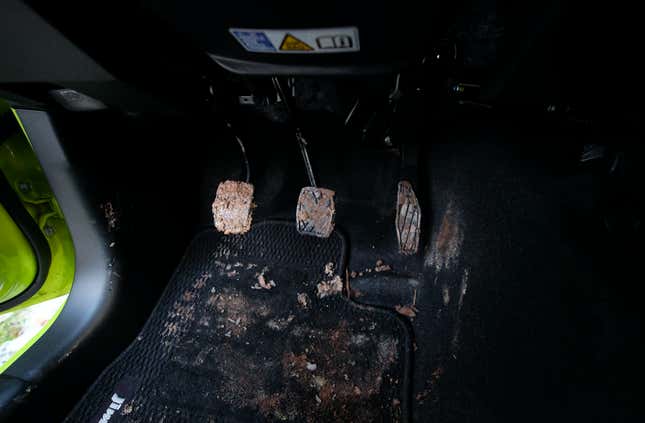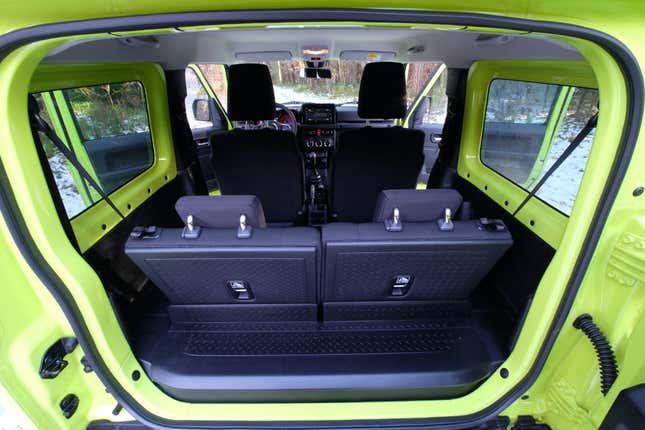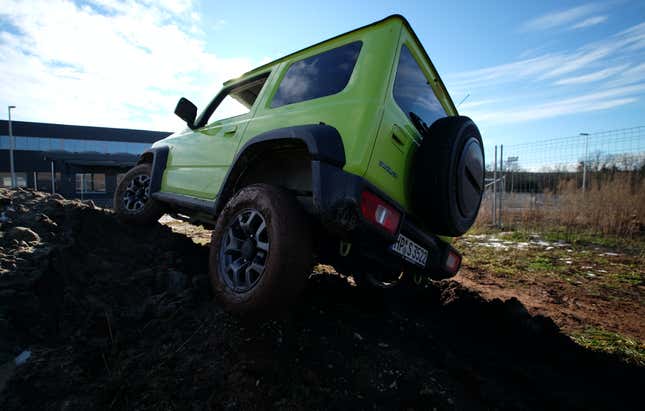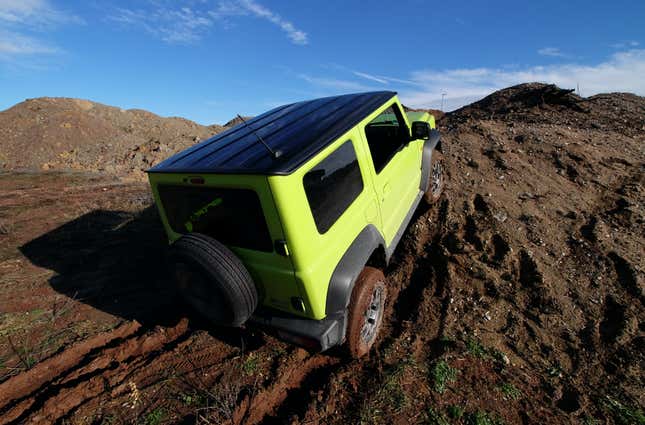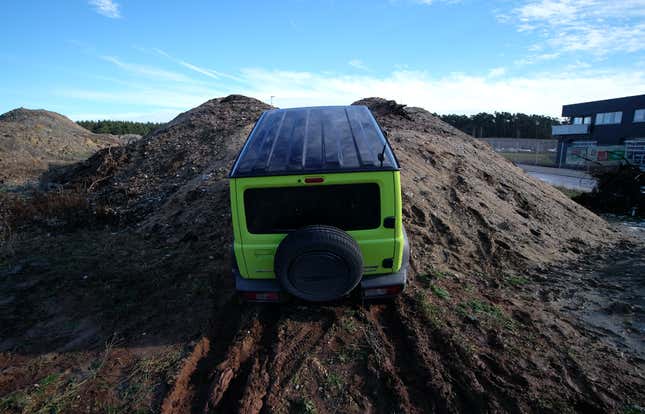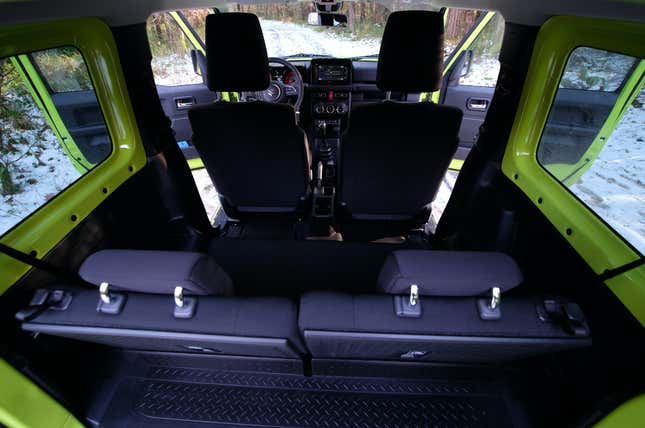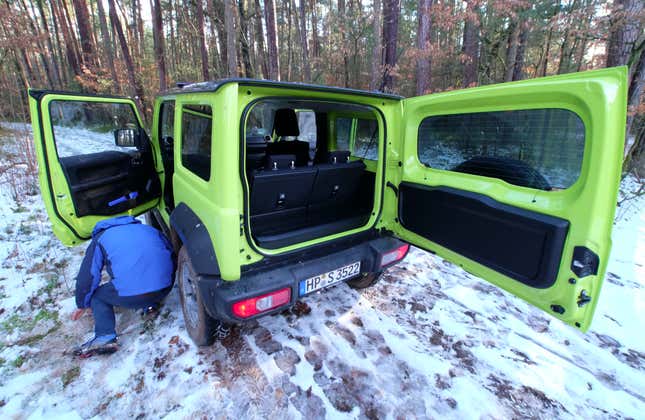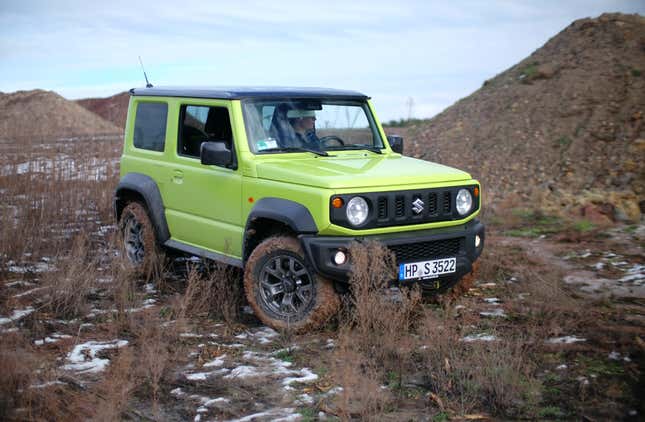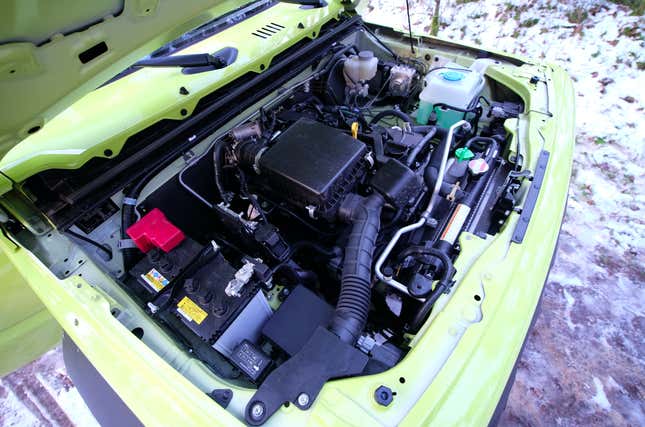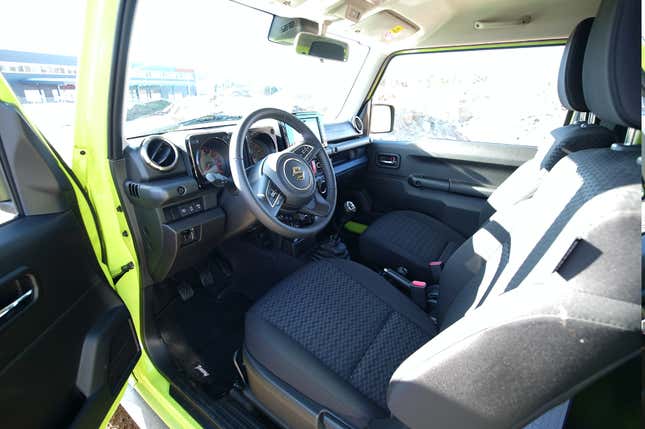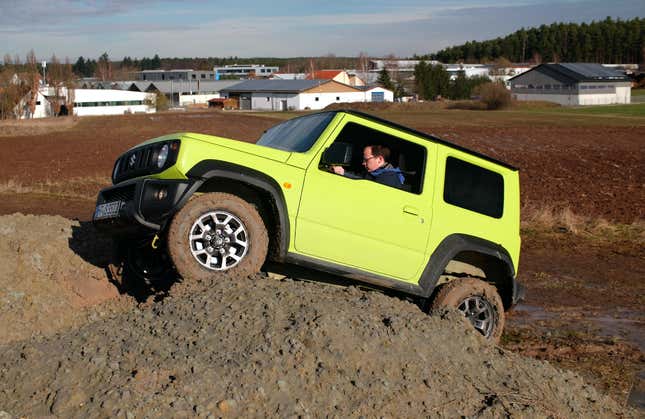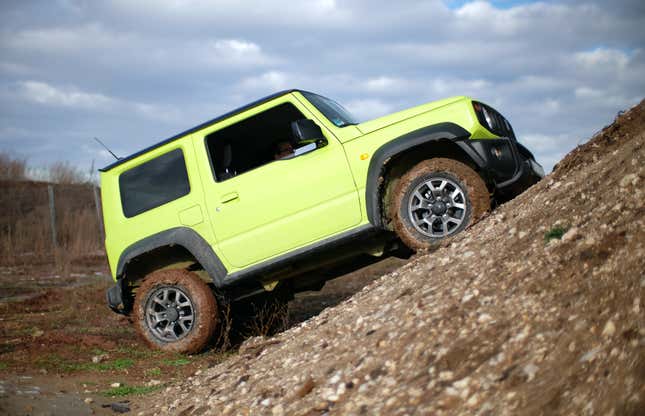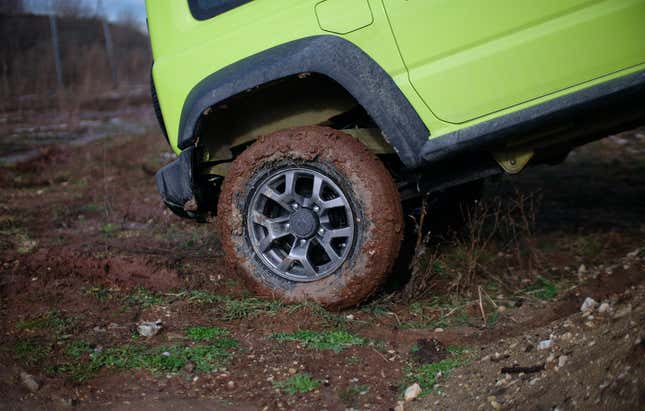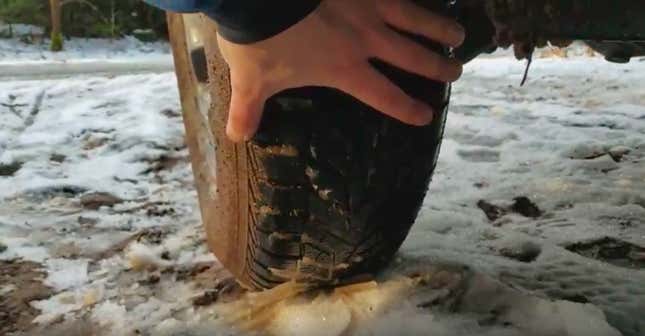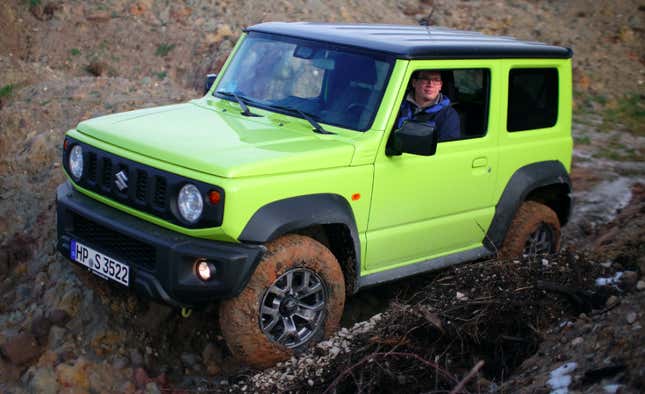To an off-road enthusiast, the 2018 Suzuki Jimny seems too good to be true. Tiny body-on-frame design, beefy solid axles, small overhangs, low curb weight, low-range transfer case, rugged looks, reasonable price—on paper, it seems perfect. I just drove the little off-roader and can confirm: It is the real deal.
Except on the highway, where it is awful.
(Full Disclosure: I wanted to drive the new Jimny so badly, I asked Suzuki’s Germany office if I could. The company directed me to a local journalist from AutoBild, who lent me his press vehicle for a day.)
“I swear, before I die, I will own one of these!” I screamed in excitement to my brother as I piloted the Suzuki Jimny over some dirt mounds in a construction site just south of Nürnberg.
I had just picked the vehicle up from the home of a German auto journalist, who had kindly led my brother and me through city streets and country roads to a field strewn with a few piles of dirt and gravel where we could play.
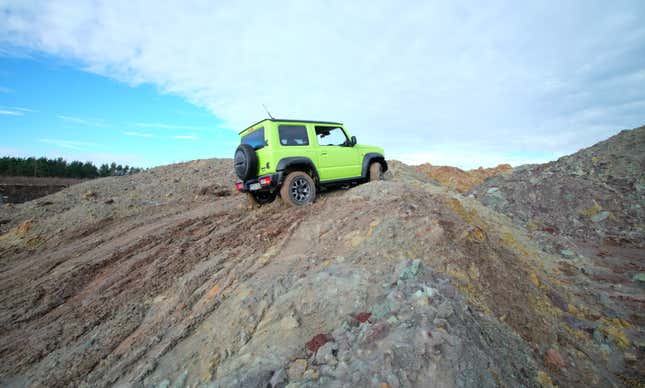
It was hardly a hardcore off-road environment, I’ll admit, but it was enough for me to get a feel for what the Jimny was like on uneven, loose terrain. And the hours I spent afterwards shooting mud from the little green box’s skinny 195 mm-section tires onto the Autobahn gave me a solid handle on what it would be like to take the Jimny on a road trip. Between the two environments, I came away deeply conflicted.
In one way, the Jimny is nearly perfect. But in another, it’s just bad. We’ll begin with the good stuff.
Off-Road
I’ll break down the new Jimny’s off-road skills into four areas: vehicle dimensions and geometry; traction and articulation; power and gearing; and robustness and underbody protection.
Let’s begin with the Jimny’s strongest attribute, and the one that makes it truly one of the best off-road bargains on the planet: geometry.
Vehicle Dimensions and Geometry
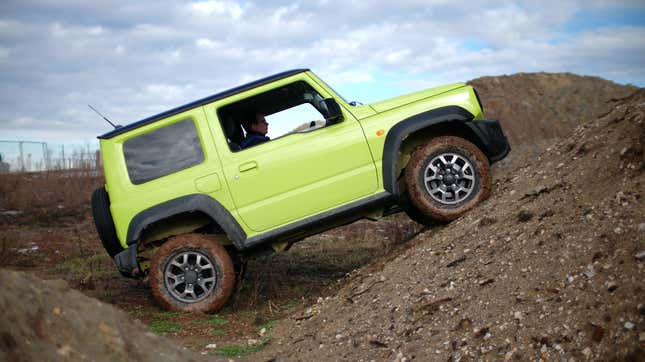
In the off-road world, the single most important attribute a vehicle can have is favorable geometry. Approach angle describes how large of a change in slope a vehicle can traverse without bashing its nose into the terrain, departure angle represents the maximum change in gradient that can be traversed without hanging up the rear bumper, and breakover angle is an indicator of how “pointy” a crest a vehicle can drive over without its belly hitting the ground.

According to Suzuki UK’s spec sheet, the Jimny’s short wheelbase, tiny overhangs, and decent ~8.3 inches of ground clearance (though the front bumper and rocker panels hang a bit low for my tastes) yield a 37 degree approach angle, 28 degree breakover angle, and 49 degree departure angle. By comparison, the undisputed king of the off-road segment in the U.S., the Jeep Wrangler, has about 1.5 inches more ground clearance and a 4.4-degree better approach angle, but a three-degree lower breakover angle and a whopping 13.1-degree lower departure angle in two-door Sport trim.
(A brief note: The Wrangler Rubicon’s specs are better than the Sport’s, of course, but that version of the Jeep is also almost twice as expensive as the Suzuki. It’s also worth noting that the German Suzuki site actually lists ground clearance at around 8.1 inches and angles that are one degree lower than the ones from the manufacturer, which are shown above. This may be due to a difference in measurement method.)
And when it comes to size and agility, the Jimny makes the Wrangler look like a veritable school bus, with a great 32.2-foot turning circle diameter and an approximately 12-foot overall length—both of which are about two feet smaller than the Wrangler’s measurements. On top of that, the Jimny is more than nine inches narrower and around six inches shorter in height than the Wrangler, and it has about an eight-inch smaller wheelbase.
To be sure, tiny dimensions aren’t always good off-road (for example, a longer wheelbase can sometimes be helpful for hill climbs), and there are a number of comfort-related compromises that come with puniness, as I’ll mention in a bit. But by and large, small is good when it comes to off-roading.
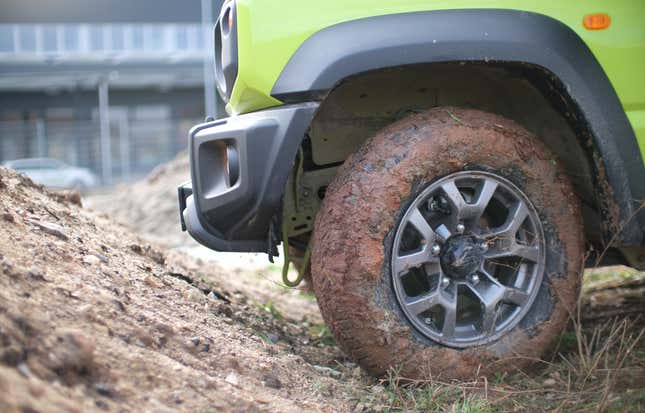
What the Suzuki’s geometry meant on my pseudo off-road course was an ability to climb up pretty much anything; it’s a bit of a cliché, but the Jimny really is a vehicle that “goes wherever you point it.” Take the slope shown above. It’s fairly steep, and I had to approach it with caution, as I wasn’t sure I could climb it without bashing the front bumper. But with my brother spotting, and just a light scrape on the license plate, the wheels were up on the grade:
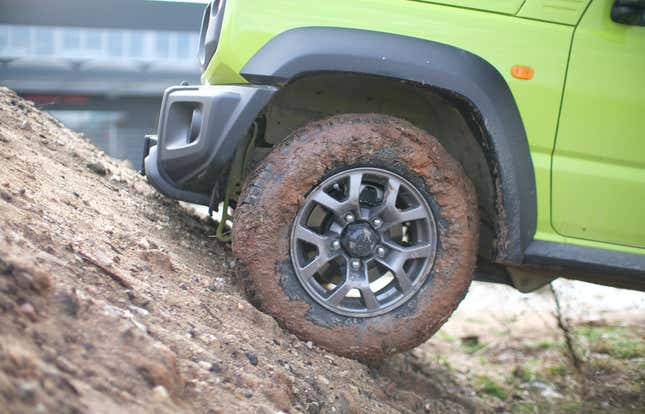
With the nose no longer at risk of bashing into the dirt, I could begin the climb:
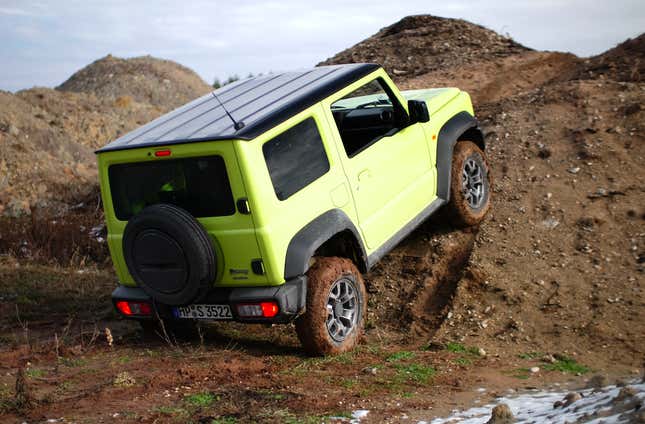
I didn’t try to get all the way to the top of the mound, since there was really nowhere to go, and I was pretty sure I didn’t have enough grip on the mud, but the point was to show just how impressive the Jimny’s approach and departure angles are. The rear bumper, for example, was nowhere close to hitting the ground:
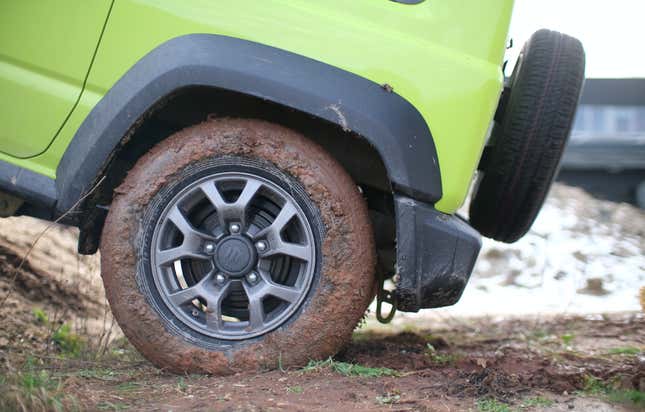
You could add another ten degrees to that slope, and the tiny rear bumper, with its fun integrated taillights, still wouldn’t make contact with the muck:
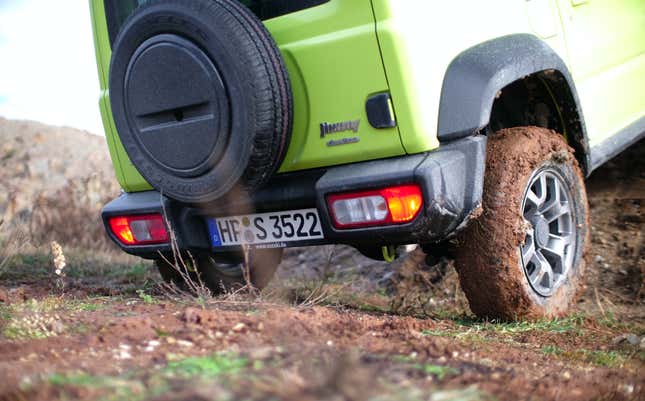
The small size and great turning radius reminded me a bit of my 1948 Willys CJ-2A, a vehicle with incredible maneuverability, compactness, and small overhangs that make it feel borderline unstoppable. Snaking the Jimny through the obstacles on even this extremely basic makeshift off-road course was a genuine thrill.
That said, it was not “unstoppable,” as I found when I attempted to traverse the mound shown below. The Jimny, despite its solid breakover angle, let out a loud crunch from its plastic rocker panel cover when I high-centered:
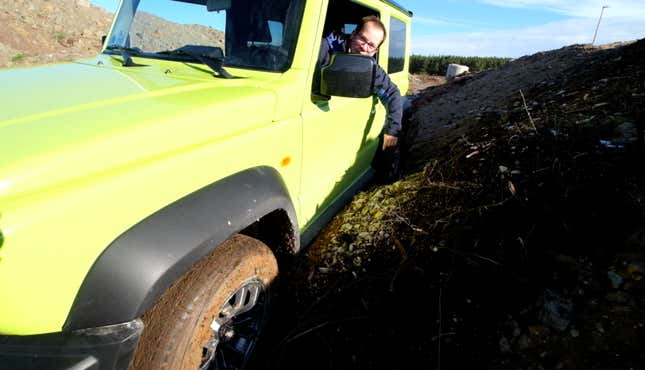
But the SUV only weighs about 2,500 (that’s ~1,500 pounds less than a Wrangler), so my brother gave me a little push, and I was unstuck in no time.
Traction, Articulation

Also called “flex” or “wheel travel,” articulation is an indication of a vehicle’s ability to keep all four tires planted on the terrain so that they can help get the vehicle moving. After watching this video of a new Jimny driving over some ramps, I didn’t think this would be the Jimny’s strong suit, and indeed, it wasn’t.
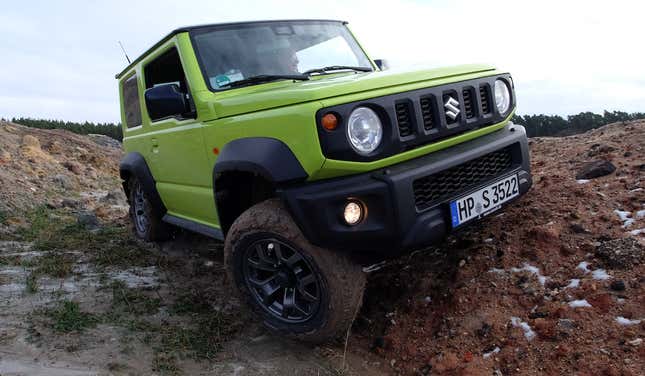
To be sure, flex wasn’t bad, and was likely more than almost any small, stock SUV with a typical independent suspension setup, but it was no Wrangler. In my short drive at the construction site, it wasn’t hard to get the Suzuki to lift a tire, and I think part of that has to do with the suspension design, which connects two solid axles to a frame via “radius arms” and track bars:
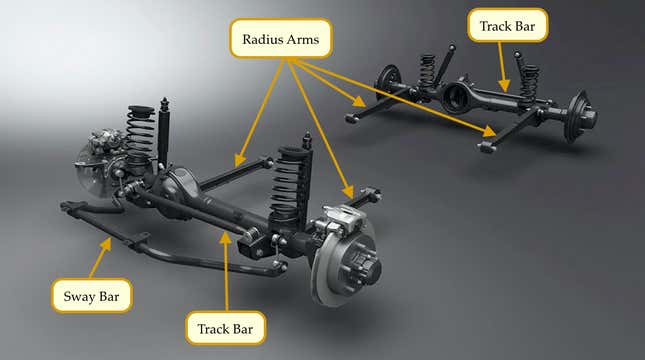
This is a bone-simple suspension setup found on some legendary off-roaders including the Land Rover Defender and Toyota Land Cruiser. Shown in the images below and above, each axle gets two control arms that each attach to the frame on one end, and to two locations on the axle at the other. Those arms locate the axles in the fore-aft direction and also prevent axle twist, while a lateral track bar on each axle locates it side-to-side.
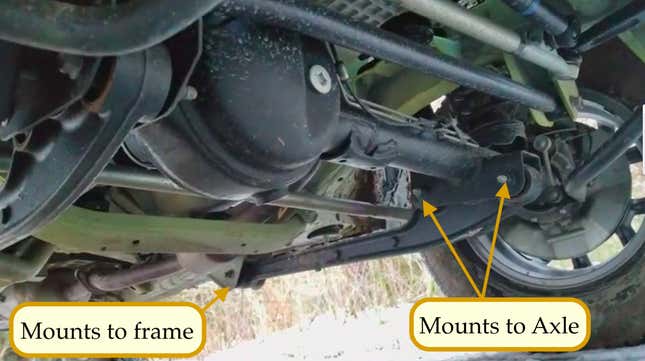
It’s extremely liftable and robust, and though it can be made to articulate decently, a stock radius arm design is often considered to limit wheel travel more so than a five-link setup like what’s on the Jeep Wrangler. The Jimny’s suspension style, along with the connected front sway bar on my test vehicle, likely contribute to the vehicle’s only “OK” flex.
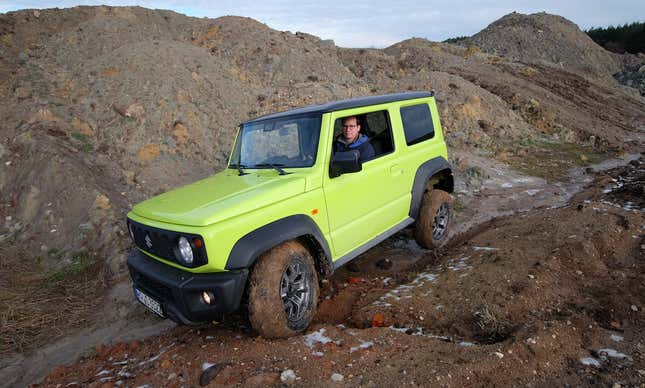
The good news is that, despite the hilariously narrow 195-section tires that quickly became wrapped in mud and that weren’t always touching the ground, the Jimny never felt at risk of getting stuck thanks to a simple but effective traction control system.
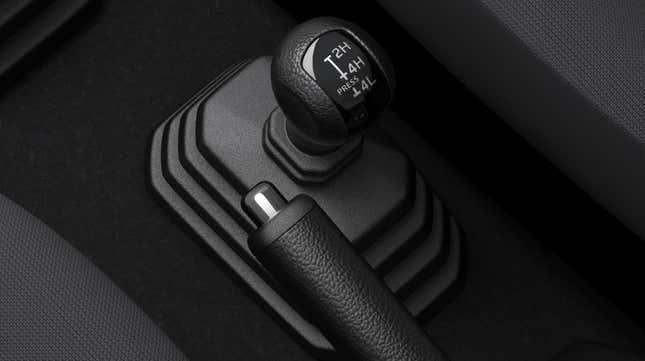
When you put the Jimny into four-wheel drive via the manual shift-on-the-fly transfer case lever between the seats, the front and rear driveshafts are locked together, receiving equal power from the 1.5-liter four-cylinder engine up front. That power from the transfer case gets sent through an open differential on each axle, so if one wheel on each axle loses traction, it will have a tendency to spin while the wheel with traction receives no power. This is no good.
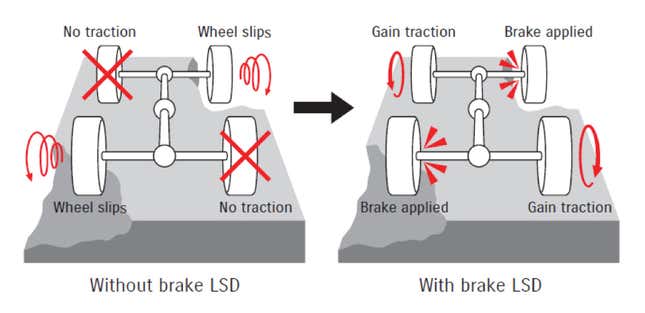
Suzuki’s traction control system fixes this by simply applying the brakes to the spinning wheel, which transfers power to the wheel with more grip.
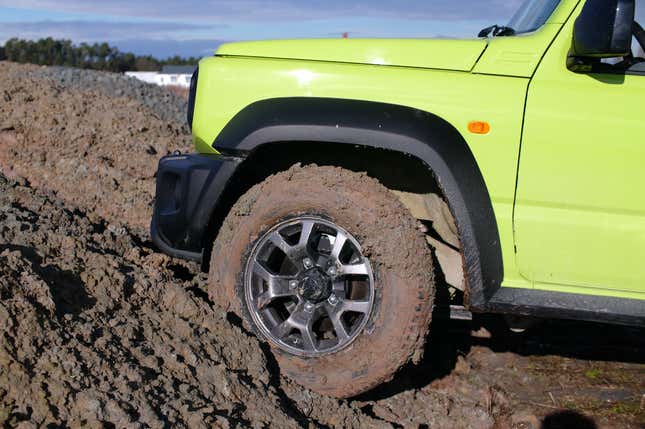
A locking differential or even a good clutch-based limited slip differential would make for smoother, more controlled low-speed crawling, but I found that this brake-lock differential setup (as some call it) was able to keep the Jimny moving forward with confidence, even if it was a bit jerky.
Power and Gearing
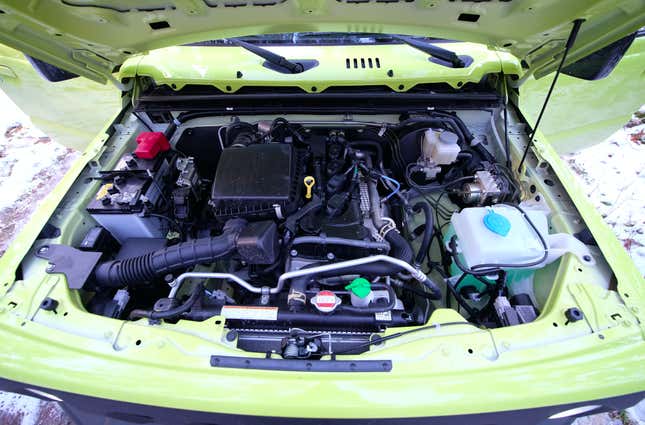
The 1.5-liter engine only makes 101 horsepower at 6,000 RPM and 96 lb-ft of torque at 4,000 revs. That might make you think that trying to crawl at low speeds with a manual transmission will lead to lots of stalls (I did stall a few times), but actually, the Jimny solves the lack of grunt with gearing.
With a 4.4-to-one first gear ratio, a 4.09-to-one final drive ratio, and a 2.0-to-one low range gear, the Jimny has a crawl ratio of over 36, which—with only 27 inch-ish inch tires—means the force between the tire and the surface is pretty decent. Maybe on a more technical course I’d have wanted a bit shorter gearing, which could also help control speed downhill (though the Jimny does get Hill Descent Control), but based on my short test, the Jimny did not feel underpowered at all in low range.
In fact, just a light touch of the throttle and a slip of the clutch got the Jimny scaling whatever grade I felt like attempting.
Underbody Protection, Recovery Points
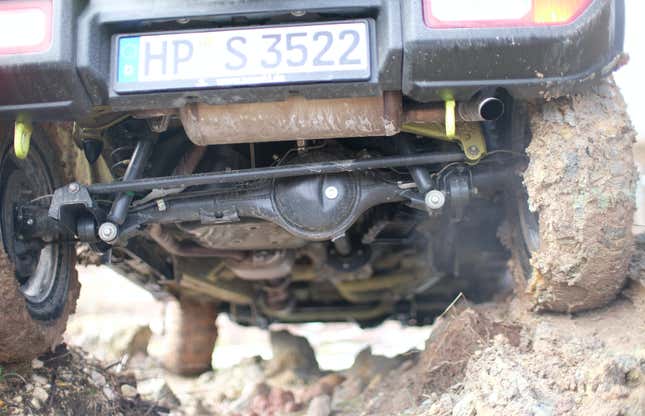
Finally, let’s talk about robustness. Even though my 90 minutes at a construction site weren’t enough to comprehensively grade in this area, I will note that the Jimny’s solid axle, body-on-frame design is inherently tough, especially since many of the components are tucked above the frame rails:
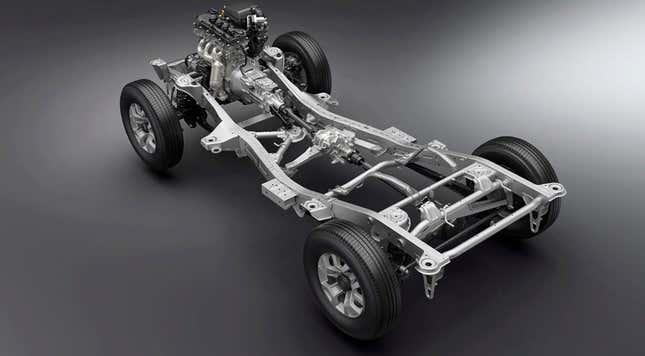
Looking underneath, I was pleased to see a skid plate covering the fuel tank:
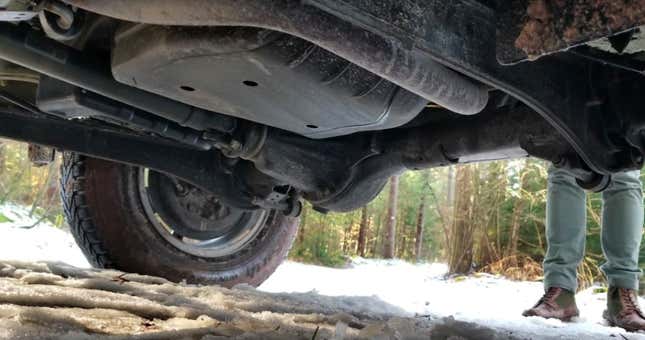
But the aluminum transfer case looked like rock bait, and could use some sort of protection:
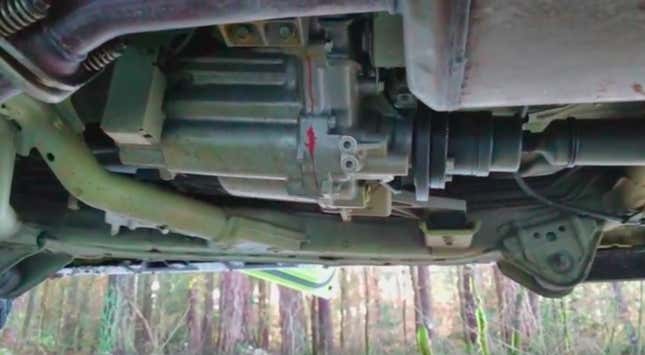
As for tow points, The Jimny’s got two small tow hooks hanging below the rear bumper (shown at the top of this section), and one hook hanging quite low below the front bumper:
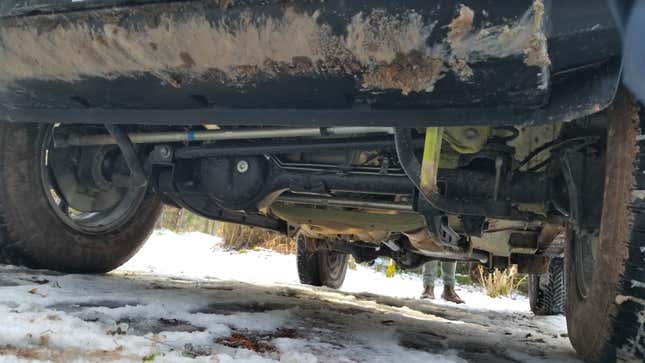
The hooks seem tiny, but the Jimny is a lightweight, miniature machine that possibly requires us to recalibrate what what passes as “strong enough.”
On The Road
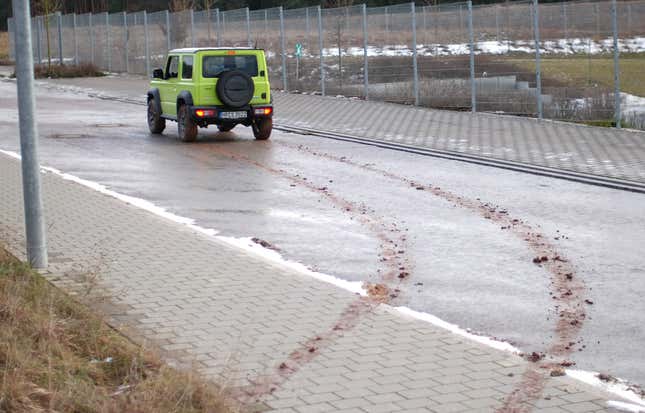
So in the end, the Not-Meant-For-The-U.S.-Market Jimny was a hell of a lot of fun “off-road,” even if I don’t think it’s quite as capable overall as Wrangler in stock form.
Still, it’s a great platform that has tons of aftermarket potential—a locking differential, flexier and taller suspension, more skid plates, and bigger tires would bring it to the next level.
As for how it did once my brother and I ventured onto the pavement, well, it’s a lot less impressive. On city streets, the Jimny was a reasonably fun little car to whip around. The five-speed was satisfying to shift, with medium to long-ish throws from an enormous shifter, and a clutch that was neither too light nor too stiff. The engine was a bit loud as it got up in the revs, but it pushed the Jimny along from stop lights and traffic signals just fine.
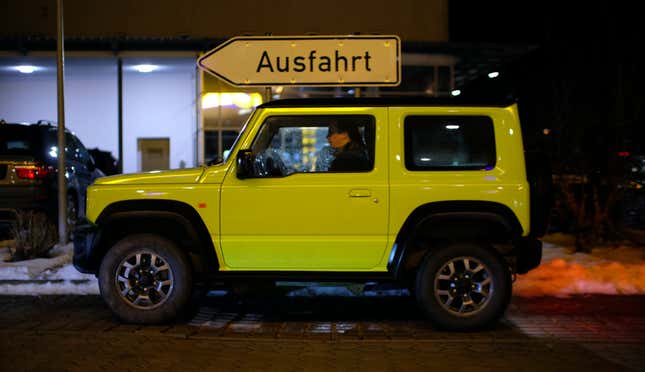
The first thing I noticed when stepping into the cabin was just how narrow the vehicle is. There’s a normal angle that I expect my left arm to make relative to my torso as my elbow rests on the door’s armrest and grips the steering wheel—in the Jimny, that angle felt significantly lower than what I’m used to. Seriously, the door feels like it’s right there. And so does the passenger.
Otherwise, the interior seemed spacious enough, especially vertically—a very tall person could drive this little machine with ease. Well, so long as his or her left arm were hanging out the window.
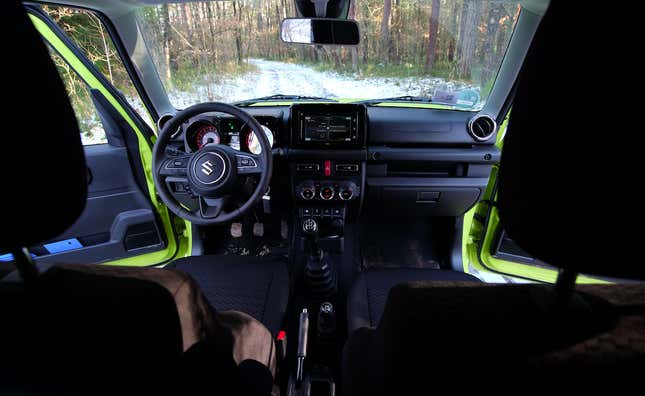
The interior is surprisingly nice, with a cool gauge cluster that places a square screen between two gauge pods, reminiscent of the gauges in an old Samurai. The center stack layout is simple but clean, though I thought the infotainment system was terrible with its lack of physical buttons near the screen and a radio that kept turning on seemingly randomly. Perhaps I needed to spend more time to figure it out, but based on my few hours behind the wheel, I was tempted to grab a baseball bat and put that touchscreen out of its misery.
Many of the materials inside the car seem “durable” (read: hard), but the seats are comfortable, rear space seemed adequate for average sized humans, and overall visibility was great.
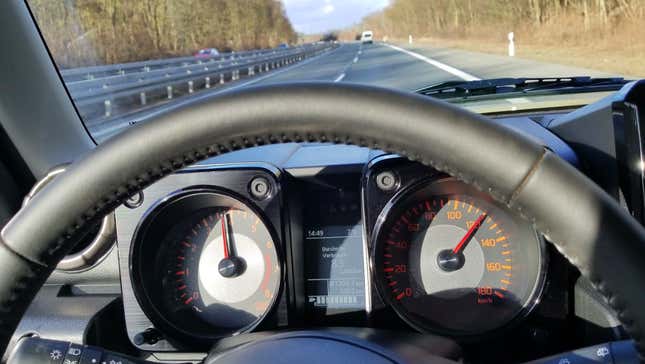
Initial Verdict
Still, despite the Jimny’s competencies—its awesome looks, low ~$20,500 asking price for a base model that comes with A/C and power windows, awesome off-road design, and OK driving experience in the city—the Jimny—a vehicle that I, for a long time, was borderline obsessed with—fell from grace on the Autobahn.
And the main culprit is a five-speed manual transmission with a fifth gear that’s only one-to-one. That, along with the short 4.09-to-one axle ratio that gives the Jimny good crawling capability, and the small tires, leads to the engine spinning at about 3,750 RPM while pushing the car 75 MPH down the highway.
Perhaps the Jimny’s motor doesn’t make enough power at, say, 2,300 RPM to keep the vehicle driving steadily at those speeds on a highway with even a slight grade, but I have to think Suzuki could add another gear to bring the revs down at least a bit.
These high revs might be acceptable with a sumptuously smooth motor, but this 1.5-liter four cylinder was buzzing around in that engine bay, making it sound as if there were a beehive on the surface of my cochlea. I can still hear the buzzing now—it haunts me.
Between that screaming motor on the Autobahn, and a suspension that, on the road, was a bit boat-like, tilting the little SUV back and forth on bumps and in turns, the Jimny went from something I dreamed about to being my worst road-trip nightmare. And this is coming from someone who drives ancient cars on a daily basis.
Actually, to be honest, despite its highway manners, I still do dream about off-roading the Jimny. Man, was that fun.
Gallery (Pics by Michael Tracy unless otherwise stated):
